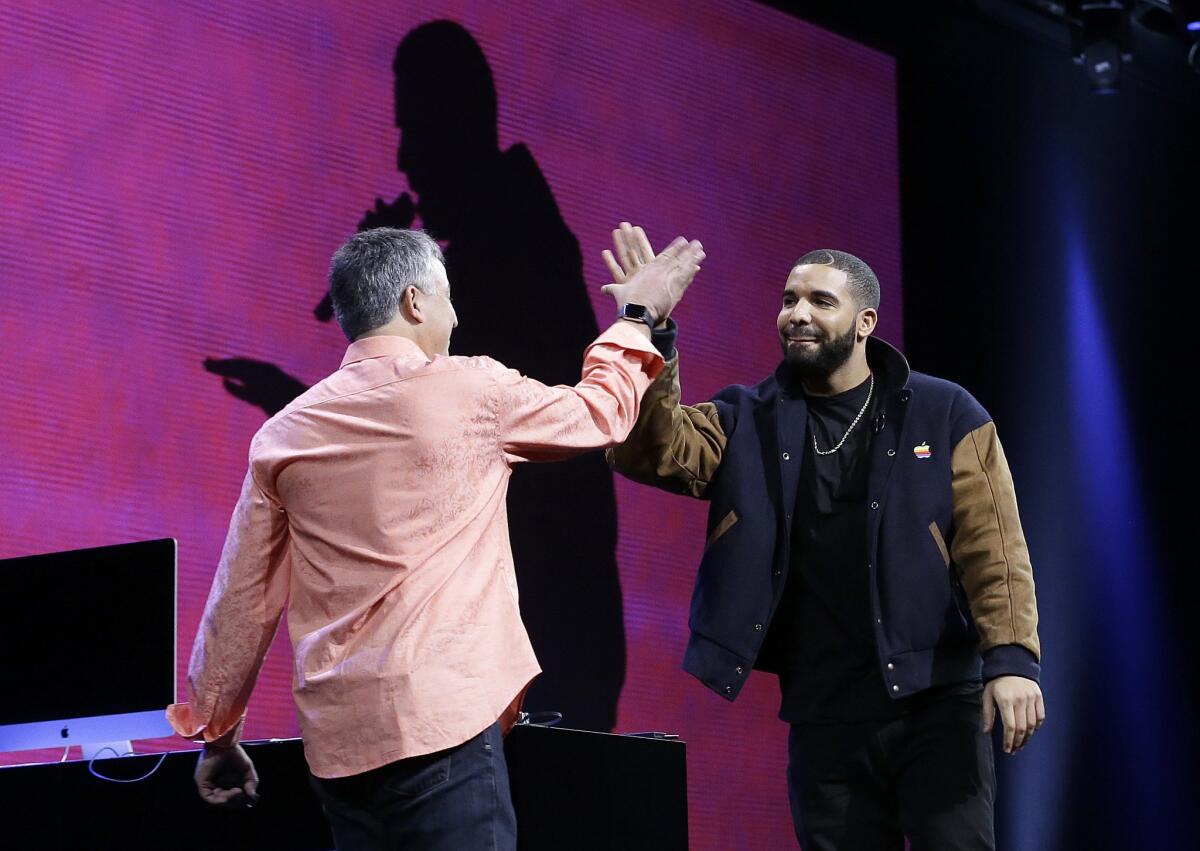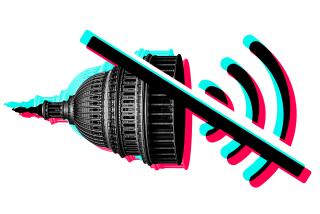Apple muscles into music streaming

Musician Drake, right, high fives Eddy Cue, Apple senior vice president of Internet Software and Services, during the Apple Worldwide Developers Conference in San Francisco.
Apple’s iTunes made its mark as the place to buy music downloads, but it left the fast-growing streaming business to rivals such as Spotify, Pandora, Rhapsody and others.
Now it’s playing catch-up. On Monday, Apple formally launched its bid to become a one-stop shop of digital music offering on-demand streaming, online radio and a feature where artists can share new tracks and video.
Music industry veteran Jimmy Iovine, Apple’s point man on the project, called it “one complete thought around music” that stands in contrast to the “fragmented mess” of streaming and download options in the market. He told the audience at Apple’s developer conference in San Francisco that the service would be revolutionary.
The big question is whether consumers will pay.
Apple hopes to entice people with a free three-month trial, but after that it will charge $9.99 a month for access to the 30 million songs in its catalog. Spotify, Apple’s main rival in streaming, gives consumers the option of a free service if they agree to hearing ads with their music.
“The challenge for everyone right now is that we have this window of consumers who lost the relationship between the appreciation of music and the commercial value of it,” said Joe Rapolla, a music professor at Monmouth University in New Jersey and a former record label executive. “There’s still a lot of work to be done. All these things are building blocks.”
Indeed, many music listeners have never paid for music — getting what they need from free services such as YouTube or file-sharing sites.
But Apple has a clear advantage over its competitors: An estimated 800 million potential customers who already use iTunes on their mobile phones, computers and tablets.
Apple, with its massive user base and knack for developing easy-to-use products, may attract many people who have so far avoided streaming. The company wants to push the industry beyond the early adopters and tech-savvy young people who have been streaming music for years.
“It’s a much higher-class horse race now,” said Larry Miller, a music business professor at NYU-Steinhardt.
Subscription streaming sales grew 39% last year worldwide, according to the International Federation of the Phonographic Industry, or IFPI. But it’s still a relatively small market — with fewer than 8 million people in the U.S. paying for streaming, according to the Recording Industry Assn. of America.
Increasing the number of subscribers is a priority for record industry executives, who have seen download sales fall in recent years. Record labels have been unhappy with the royalties generated from ad-supported streaming, and that has triggered debates in the tech and music industries over how artists are paid.
Warner Music Group Chief Executive Steve Cooper called Apple’s announcement “a milestone moment for our industry,” and said the increased competition in the space would help drive growth.
“Right now, accelerating the global proliferation of paying subscribers is one of our most important goals, and Apple’s massive resources and huge customer base will make it a powerful player in turbocharging that growth,” Cooper said in a statement.
There’s no doubt that digital music purchases are dwindling — down about 8% in 2014 compared with the previous year, according to the IFPI. But, despite the trend, downloads are still a big business for Apple. The iTunes store, which also sells movies and apps, generated $10.2 billion in sales last year.
Music downloads probably aren’t going away any time soon for a number of reasons. Streaming can be an expensive drain on mobile phone data plans, and there are also rural parts of the country where it’s hard to get a signal.
But analysts see streaming as the way of the future as mobile networks continue to get built out. The popularity of streaming, even if it’s not a massive financial driver just yet, is one reason Apple spent $3 billion last year to buy music streaming and headphone maker Beats from Iovine and rapper Dr. Dre.
Apple is hoping that it has packed enough new features in its new service to entice users.
Apple Music will suggest albums and playlists based on users’ tastes and listening history, and it also hired music experts to build playlists. It has also revamped its iTunes Radio as Apple Music Radio, adding a 24-hour online station called Beats 1. The station will feature popular DJs such as Zane Lowe in Los Angeles, Ebro Darden in New York and Julie Adenuga in London. Users can access Beats 1 without a subscription.
Users will also be able to run the service with Apple’s voice command app Siri, with commands like “Play ‘Born to Run’” or “Play the top song from May 1982.”
Apple Music will launch June 30 in 100 countries for iPhone, iPad and iPod Touch devices and will be available for Windows and Android products in the fall. Its pricing plan includes a family option, in which up to six members can share a $14.99-a-month subscription.
Competitors offered varying reactions, some welcoming and some skeptical. Alexander Ljung, CEO of digital music company SoundCloud, said at a conference in Cannes, France, that Apple’s service could convert droves of people to streaming and increase revenues industrywide.
“I still feel like it’s early days,” he said at the Midem conference before the Apple Music announcement. “The amount of listening happening on streaming is still very small. Apple is going to rapidly increase the market for all of us.”
Spotify CEO Daniel Ek cryptically tweeted “Oh ok” after the Apple reveal, only to quickly delete the post. Ek has taken to outlets such as Billboard to defend the so-called freemium model, which entices users with free, ad-supported access and charges to avoid commercials.
Spotify, the current leader in subscription streaming, has 15 million paying customers and 45 million who use its free service. Paris-based Deezer has 6 million who pay, out of a total of 16 million users. Pandora, based in Oakland, counts 79.2 million monthly active users, the vast majority of whom opt for its free version.
More to Read
From the Oscars to the Emmys.
Get the Envelope newsletter for exclusive awards season coverage, behind-the-scenes stories from the Envelope podcast and columnist Glenn Whipp’s must-read analysis.
You may occasionally receive promotional content from the Los Angeles Times.







